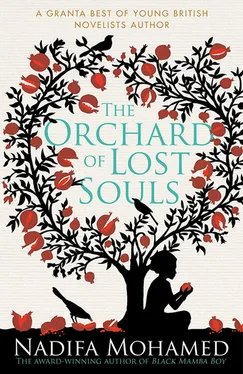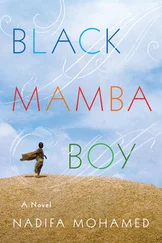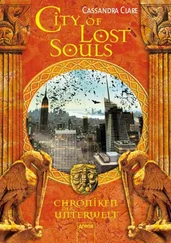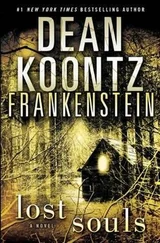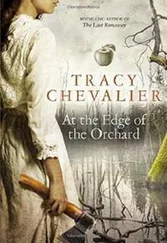‘We have no idea, sir, communications keep failing.’
Filsan approaches Roble and whispers in his ear, ‘I want to stay with you.’
‘Just go, Filsan, this is serious.’
Meeting his eyes she feels a sudden surge of hatred towards him. What makes him think he is better than her? ‘I’m going, Captain.’
‘Walk her home,’ he orders to no one in particular, but she marches on ahead without waiting.
The road is a pale strip surrounded by black trees, black walls, black absences where lives should be. It is only seven p.m. but there is not a sound apart from the thud of her boots.
She checks over her shoulder, sees a soldier from the checkpoint following her half-heartedly at a distance; his presence irritates her more and she speeds up, promising herself that she will never even look at Roble again, that she will teach him a lesson for humiliating her. She knows she will see him at his desk the next day, excitedly describing how the rebel assault was bloodily put down in Burao.
She doesn’t pay attention when the bushes beside her seem to whisper and shift, her eyes are fixed on the side turning to the barracks and do not register the shrubs lifting up off the ground. She pushes a strand of hair away from her forehead and adjusts the rifle strap to stop the gun knocking against her thigh. All she wants is a shower and then to fall asleep.
Filsan ascribes the crack of a twig breaking behind her to a stray animal, the scent of musty sweat to her long physical day but a fluttering doubt makes her stop and turn around.
Stretched across the road are jinns with tangled branches growing from their heads and arms; she reaches out to touch one of the silhouetted figures and is surprised to feel real flesh against her fingers.
‘Raise your hands,’ the jinn demands in a Hargeisa accent, before drawing a Kalashnikov up to her face.
Kawsar’s door withstands five heavy bangs before smashing open. She turns to find an adolescent soldier dressed in a camouflage jacket in her room; their eyes meet for an instant before he retreats. The door clicks back into place but the bar lock is broken, swinging from its screws.
‘Well?’ says a voice behind him.
‘Ransacked, nothing in there. Let’s go.’
She wonders if he saw her or if he thought it was a corpse that met his gaze. How would she even know if she had died? There is no one to wail or weep beside her. No neighbour has come to check on her and from that she knows they must be either dead or gone.
Her head is pounding and her throat sore. She pours a glass of dusty water from the jug and checks the packet of painkillers. Only five left. She swallows them down. There are still footsteps outside her window, heavy boots on concrete. The soldiers are laughing, the mysterious delight of boys at play They are probably going through the undergarments in Maryam’s bedroom.
Kawsar rests a cheek against her damp acacia-print pillow case, tears hanging from the thin branches like leaves. She feels woozy, sepia images and sunken sounds washing up from the seabed of her mind: the thud of policemen’s laced boots as they paraded before the District Commissioner in Salahley. She had loved that sound when she was young, remembers bringing the breakfast dishes in a bowl to the veranda so she could listen to the thump of her husband’s feet on the grit; it flew to her over the birdsong, clinking metal plates and the British sergeant’s screamed commands. The policemen then were beautiful, their hair glossed and parted sharply to the side, their uniforms smelling of detergent and soap. Kawsar had dressed her new husband Farah as if he were a doll, washing and ironing his clothes every day, polishing his boots at night with Kiwi wax. She had taken pride in his appearance as well as her own. They planned to take their country back from the British and look beautiful while doing it.
She takes another sip of water and recites the prayer for the dying. She can accept a simple bullet — there is no need for them to waste their time on an old woman — but she fears they will pull her out of the bed or try to make her stand up. She intends to offer them the gold and cash under the mattress if they promise to not move her. It is a pathetic vigil. She places the radio next to her ear, turns the volume down and switches it on. For years the airwaves have been a frontline in the war between the dictator and the rebels, but now Oodweyne’s voice crackles out of the speaker, crisper, clearer and more triumphant with every word.
‘Citizens, we have been driven to extreme but decisive action. We appealed to our comrades in the North to seek peaceful means of resolving our differences; we begged them to not allow our sovereignty to be undermined by enemies of the Somali people and their collaborators. Our forbearance in the face of terrorism has earned us the sympathy of the world, even the President of the United States is sending aid to eradicate the threat we’re facing: a US Navy ship is expected to arrive imminently in Berbera port to deliver necessary supplies. We have the means and will to achieve a victory never seen before in our history and all anti-revolutionaries will learn bitterly what it means to defy authority and progress.’
Before the announcement is repeated Kawsar kills his voice. It is not so painful to die when all that she knows is dying around her. It seems as if the world had been built just for her and is being dismantled as she departs. Late one night towards the end of the sixties, in Mogadishu’s National Theatre, Kawsar had sat waiting for Farah to return to their table. She had pleaded with him to take her out while they stayed in the capital for his police training, but everywhere they went his attention was stolen by his Somali Youth League friends. She had watched forlornly as cleaners swept the floor and stagehands took apart the city that had seemed so alive only minutes earlier. Smooth-faced apprentice carpenters, who pinched almonds out of golden bricks of real halwa, dragged the comedian’s confectionery stall off the stage. A painted sunset backdrop fluttering with inky birds was rolled up and eased into a cardboard tube by another boy. Kawsar, who had been the first to build a bungalow on October Road, would see it forced back to its original state too, the homes levelled to the ground so that the juniper trees and baboons could return.
Deqo’s eyes snap open inside her barrel. It sounds as if men with hammers are smashing on its exterior. BANG, CRASH, BANG. She rises on her haunches and looks out but there’s nobody there, just the usual silent circle of trees. Still the blows continue and Deqo steps out of the barrel to investigate. She hasn’t seen another soul for weeks, having avoided the town and market in case the old man found her. The hair on her head is wild and hopelessly knotted, and her skin shows through the holes in the now-ragged dress she had fled Nasra’s house wearing. Her mouth is raw from her diet of hard, unripe fruit and she has lost every ounce of weight she had put on in Hargeisa; now taller, lean and spare, she doesn’t hear her footsteps when she walks, but rather seems to float over the earth, leaving no imprint. The flashes in the sky are welcome, the more rain that falls the greater her store of drinking water in the bucket that she has appropriated from the rubbish heap under the bridge.
As she squints up, she notices how oddly the lightning strikes; it seems to shoot up from the ground rather than downwards, and the thunder is guttural and metallic at once. A plane swoops deafeningly overhead and she stumbles into the bushes in fear. As she approaches the concrete bridge over the ditch, the ground rumbles from the procession of slow, dark green tanks crossing from north to south; she imagines there must be another parade taking place in the stadium, another day of soldiers, speeches and dances. After the tanks pass, the bridge is empty and she climbs the embankment up to it. She checks south to the airport and north towards the theatre: pillars of smoke stand irregularly here and there and everything is eerily quiet, apart from the mysterious blasts she could hear from the ditch.
Читать дальше
